- 1Department of Environmental Health, College of Health Sciences, Debre Markos University, Debre Markos, Ethiopia
- 2Department of Health Informatics, College of Medicine and Health Sciences, Debre Markos University, Debre Markos, Ethiopia
- 3Department of Pharmacy, College of Health Sciences, Debre Markos University, Debre Markos, Ethiopia
Background: Food safety is a major public health concern, with 10%−20% of foodborne disease outbreaks linked to contamination by food handlers. The problem is especially severe in developing countries like Ethiopia, mainly due to poor sanitation and improper food handling.
Objectives: To assess food safety practices and associated factors among food handlers working in food and drinking establishments in Finote Selam, in Resource-Limited Settings.
Methods: A community-based cross-sectional study was conducted from February 20 to March 20, 2024 involving 412 randomly selected food handlers in Finote Selam, Ethiopia. Data were collected via a structured questionnaire and analyzed using SPSS version 26. Descriptive statistics summarized socio-demographic data, while bivariate and multivariable logistic regression identified associated factors. Variables with p < 0.25 in bivariate analysis were included in the multivariable model. Results were reported using adjusted odds ratios (AOR) with 95% confidence intervals, and significance was set at p ≤ 0.05.
Results: A total of 412 food handlers participated in the study, with 51.6% revealing poor food safety practices. Significant factors associated with poor practices included lack of food safety training (AOR = 3.721; 95% CI: 1.380–8.982), limited work experience (AOR = 3.050; 95% CI: 1.873–4.986), lack of regular supervision (AOR = 1.653; 95% CI: 1.108–2.538), and inadequate food safety knowledge (AOR = 1.25; 95% CI: 1.082–2.934).
Conclusion: The present study revealed poor food handling practices among food handlers. The main factors associated with these poor practices were lack of food safety training, limited work experience, insufficient supervision, and inadequate food safety knowledge. Food handlers should receive regular training on food hygiene and safety to improve their knowledge and practices. Additionally, routine sanitary inspections of food and drink establishments are recommended.
Introduction
Food safety is a critical public health issue essential for preventing and controlling foodborne illnesses. In response to the rising incidence of such illnesses, governments around the world are intensifying efforts to improve food safety. Notably, 10%−20% of foodborne disease outbreaks are attributed to contamination by food handlers, highlighting the need for stricter hygiene practices and food safety measures (Dagne et al., 2019). Food safety is defined by the World Health Organization (WHO) as the conditions and precautions required during food production, processing, storage, distribution, and preparation to guarantee that the food is healthy, safe, and suitable for human consumption (Abdi et al., 2020; Alzhrani and Shatwan, 2024). Global attention on food safety has increased to protect public health and prevent illnesses from poor-quality food (Alemayehu et al., 2021).
The World Health Organization reports that inadequate food handling leads to 600 million cases of food-borne diseases each year (Lema et al., 2020). Additionally, estimates show that up to 30% of people in developed countries experience food-borne illnesses annually (Nortey et al., 2024). The WHO revealed that 1 in 10 people globally suffers from food-borne illnesses due to unsafe food practices and contaminated food (Tessema et al., 2014). Food-borne diseases are particularly serious in developing countries because of challenges in maintaining proper food handling practices and poor sanitation. Poor personal hygiene, inadequate food handling, and contaminated surfaces among food handlers in restaurants can lead to the bacteria and intestinal parasites (Tamiru et al., 2022; Osafo et al., 2022; Yesigat et al., 2020).
Evidence showed in developing countries, around to 70% of diarrheal cases are associated with contaminated food, with particularly poor hygiene practices which contribute to high morbidity and mortality rates (Teferi, 2020). Findings of different studies showed that there are relatively few food safety problems in some Asian countries like Indonesia, Jordan, and Saudi Arabia, which ranged from 10 to 19.31%, respectively (Dora-Liyana et al., 2018). Additionally, lifestyle changes and urbanization are causing people to eat out more frequently, resulting in the unregulated establishment of dining places with insufficient hygiene standards (Teferi et al., 2021; Ruel et al., 2017; Fatunmbi, 2012).
In Ethiopia, food-borne illnesses such as diarrhea were reported by Save the Children, an international humanitarian organization, during the early months of 2023, with an estimated 156 cases and two deaths (Mutua et al., 2022). This indicates possible potential issues with food safety and hygiene practices (Pattabhiramaiah and Mallikarjunaiah, 2023). Almost all classes of people in Ethiopia consume food from food establishments, while some are discouraged from doing so due to contamination and poor hygienic conditions (Nordhagen et al., 2024; Bogale et al., 2016). Food safety practices are worse in developing countries, including Ethiopia; according to previous studies conducted in Addis Ababa and other areas of the country, less than half of food handlers have maintained satisfactory safety practices in handling food in the studied food establishments (Abdi et al., 2020; Alemayehu et al., 2021; Teferi et al., 2021). Foodborne diseases are prevalent in Ethiopia; the country's annual incidence of foodborne illnesses ranged from 3.4 to 9.3% (Teferi et al., 2021).
This study filled a critical gap by assessing food safety practices and associated factors among food handlers in Finote Selam, a resource-limited town where systemic barriers severely affected food safety. Although foodborne diseases remained a major public health problem in Ethiopia, few studies had examined smaller towns with deep-rooted socioeconomic and infrastructural challenges (Gazu et al., 2023). By providing context-specific evidence, this study advanced understanding of how structural inequalities influenced grassroots food safety practices, an area largely neglected in Ethiopian and global research. The findings will offer important insights for public health professionals, policymakers, and those working in food safety.
Methods and materials
Study design, setting, period
A cross-sectional study was conducted among food handlers in, Ethiopia from February 20 to March 20, 2024. The study was conducted in the Finote Selam town west Gojjam zone Amhara regional state. Geographical coordinates the study area lies within the coordinates between 370 16′0.12"−370 9′36"N latitudes and 100 42′0"−100 24′57.6"E longitudes. The location of the study area is also situated to the north-west direction of Addis Ababa at a distance of 387 and 176 km from the south of Bahir Dar the capital city of the Amhara regional state. The total area of the town is 4,247.9 ha and the study area is mainly located to the southeast of Dembecha town, southwest of Bure town, North West of Sekela district, northeast of Kuarit district, and the east of Dega Damot district (Desta, 2022).
Population and eligibility criteria
The source populations were all food handlers working in food and drinking establishments of Finote Selam City. Food handlers working in preparation, cleaning and service areas of food establishments at the time of the study regardless of their sex and employment status were included in this study. However, food handlers who refused to participate this study were excluded from the study.
Sample size determination and sampling procedure
The required sample size for the study is determined using single population proportion formula according to the available literature considering a 5% margin of error, a 95% confidence level, and a 44.9 % prevalence of food hygiene practices from a previous study (Abdi et al., 2020).
An additional 10% was added to account for potential non-responses, resulting in a final sample size of 418 food handlers. The study targeted food handlers working in food and drinking establishments in Finote Selam, Ethiopia. The list of existing food establishments and the number of food handlers currently working in food establishments were obtained from Finote Selam towns' Trade and Industry Office. Then, food establishments for this study were randomly selected from a total list of food establishments. Next, study participants were proportionately allocated to each selected food establishment based on the number of food handlers. Then, an updated list of food handlers was taken from the manager or owner of the selected establishment. Finally, study participants were selected using a simple random method from each establishment.
Study variables
The dependent variable in this study is food safety practices, specifically practices ensuring that food poses no harm to consumers when prepared and consumed as intended. The independent variables included socio-demographic factors (such as age, education, gender, marital status, work experience, and responsibilities), institutional and health-related factors for food handlers (including food safety training, regular supervision, knowledge of food safety practices, and routine medical checkups), and sanitary facility-related factors for food handlers (like the presence of a refrigerator in the kitchen, suitable water storage equipment, and separate dishwashing systems).
Data collection tools and procedures
Data were collected using a structured questionnaire adopted and modified from previously published studies (Alemayehu et al., 2021; Tamiru et al., 2022). The questionnaire was structured into five parts; socio-demographic characteristics of study participants with six questions, institutional and health related factors with four questions, sanitary facility related factors with three questions and food safety practices with eight questions. Food safety practices were assessed using eight closed ended questions with two possible answers each: “yes” or “no”. Each response indicating safe practice was assigned a score of one, while responses indicating unsafe practice received a score of zero. Food handlers that obtained total score equal to or greater than the mean were considered to have good food safety practices and those with a score less than the mean were considered to have poor food safety practices (Alemayehu et al., 2021). Three public health students and one supervisor with experience in data collection were hired to carry out the data collection process.
Data quality assurance
Data quality was ensured throughout the data collection process. One-day training was provided for research assistants and supervisors to familiarize them with the necessary knowledge and skills for effective data gathering. The data collection tool was pilot tested on 5% of the sample size in the study area, and its reliability was confirmed with a Cronbach's alpha of 0.82, indicating high internal consistency. Since the reliability was within the acceptable range (Cronbach's alpha > 0.7), no major modifications were required after the pre-test. Results from the pilot test were excluded from the final analysis. Additionally, incomplete and inconsistent questionnaires were removed before data analysis.
Data processing and analysis
SPSS version 26 was used for analysis. A descriptive analysis was used to describe the percentages and number of distributions of the respondents by socio-demographic characteristics and other relevant variables in the study. Bivariate and multivariate analysis was employed to identify the relationships and associations within the data. In binary logistic regression analysis, the independent variables with a p-value < 0.25 were entered into the multivariable logistic regression analysis to control for potential confounders and identify significant factors associated with outcome variables. In measuring associations, adjusted odds ratios (AORs) were used, accompanied by a 95% confidence interval (CI). Variables with a p-value ≤ 0.05 were considered statistically significant.
Results
Socio-demographic characteristics of food handlers
In this study, a total of 412 food handlers participated, yielding a response rate of 98.6%. The majority of participants (75.2%) were aged 20–29, and a significant proportion (85.3%) were male. Over 79.5% had non-formal education, and more than half (52.0%) were married. Additionally, approximately 211 participants (69.0%) had been working as food handlers for 3 years or more (Table 1).
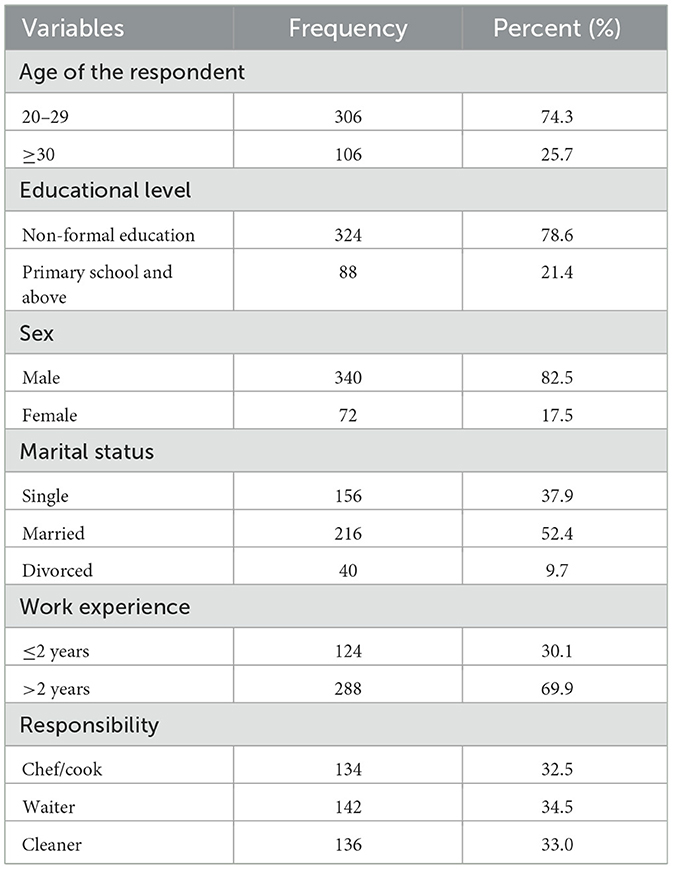
Table 1. Socio-demographic characteristics of the respondent among food handlers working in food and drinking establishments in Finote Selam, Ethiopia, 2024 (n = 412).
Institutional and health related factors of food handlers
The majority of food handlers, 323 (78.4%), had no training in food safety practices. Additionally, 233 (56.6%) reported a lack of regular supervision. Most respondents, 262 (63.6%), had inadequate awareness of food safety practices. Furthermore, 299 (72.6%) of the participants did not receive regular medical checkups (Table 2).
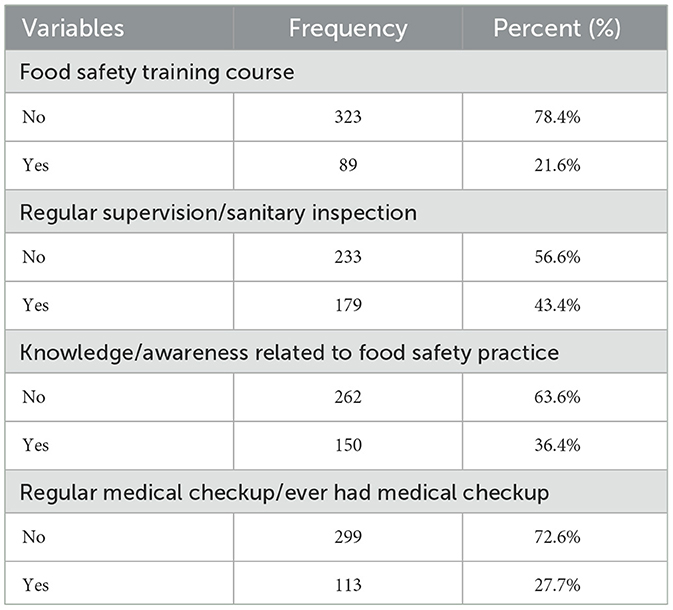
Table 2. Institutional and Health related factors of the respondent among food handlers working in food and drinking establishments in Finote Selam, Ethiopia, 2024 (n = 412).
Sanitary facility related factors of food handlers
Most food handlers, 291 (70.6%), reported having a refrigerator in the kitchen. Regarding water storage equipment, 264 (64.1%) had appropriate storage available, while a majority (241, 58.5%) used separate dishwashing systems (Table 3).
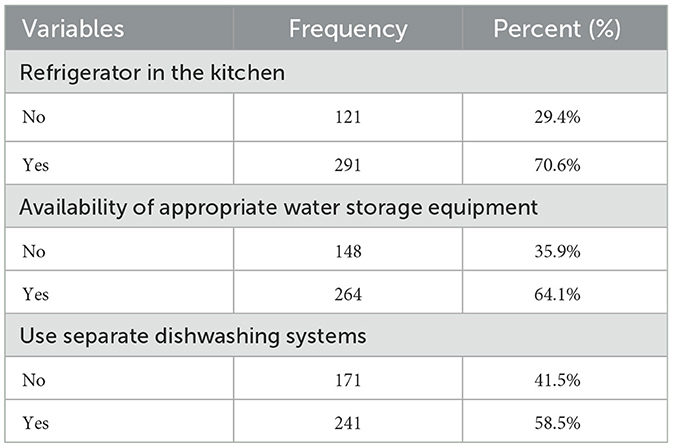
Table 3. Sanitary facility-related factors of the respondents among food handlers working in food and drinking establishments in Finote Selam, Ethiopia, 2024 (n = 412).
Food safety practice of food handlers
Most food handlers, 372 (90.3%), did not wear gloves when handling food, and 365 (88.6%) failed to use proper hair coverings. Additionally, 230 handlers (55.8%) neglected to wash their hands after handling unwrapped food items.
Regarding positive practices, 220 food handlers (53.4%) reported regularly checking expiration dates, while 222 (53.9%) maintained separate utensils for raw and cooked foods. Hand hygiene showed relatively better compliance, with 329 handlers (79.9%) properly cleansing their hands after sneezing (Table 4).
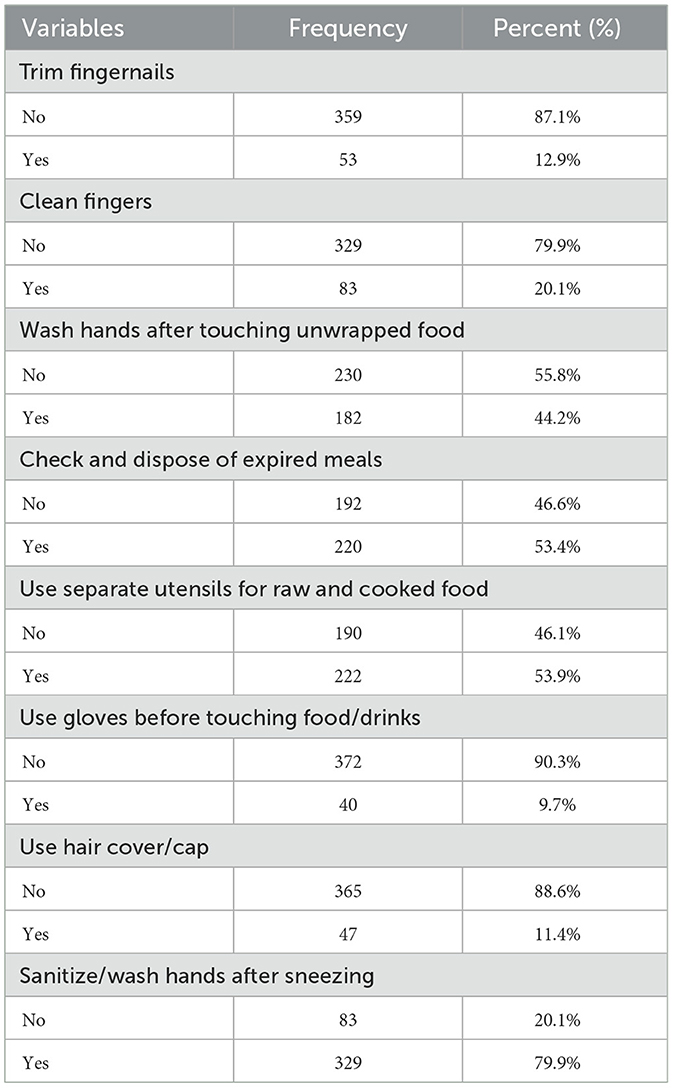
Table 4. Food safety practice of the respondent among food handlers working in food and drinking establishments in Finote Selam town, Ethiopia, 2024 (n = 412).
The findings of this study revealed that the level of practice among participants was nearly evenly distributed between good and poor practices. Specifically, 51.6% of the respondents exhibited poor practice, while 48.4% demonstrated good practice. This indicates that a slightly higher proportion of the population did not adhere to the recommended practices, highlighting the need for targeted interventions to improve behavioral compliance and awareness (Figure 1).
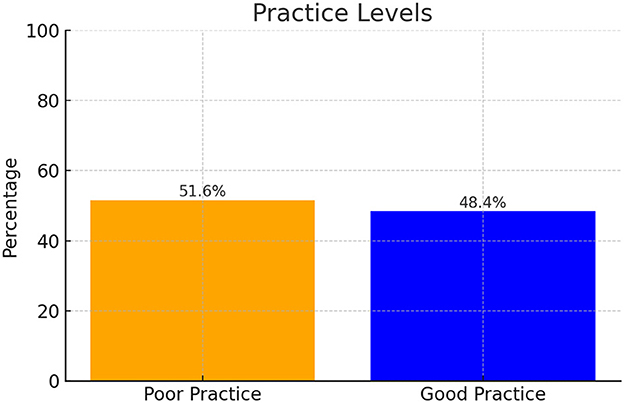
Figure 1. Overall food safety practice among food handlers in Finote Selam, Ethiopia, 2024 (n = 412).
Factors associated with food safety practice among food handlers
In the bivariate logistic regression analysis, factors such as food safety training, work experience, availability of water storage equipment, regular supervision, and knowledge of food safety were significantly associated with food safety practices. In the final multivariable logistic regression model, food handlers with ≤2 years of work experience had significantly higher odds of poor food safety practices compared to those with >2 years of experience (AOR = 3.050; 95% CI: 1.873–4.986). Similarly, food handlers who had not received food safety training were more likely to have poor food safety practices than those who had received training (AOR = 3.721; 95% CI: 1.380–8.982). Establishments lacking regular supervision were also associated with higher odds of poor food safety practices (AOR = 1.653; 95% CI: 1.108–2.538). Moreover, food handlers with poor knowledge of food safety had increased odds of poor practices (AOR = 1.25; 95% CI: 1.082–2.934). While the presence of water storage equipment showed a positive trend toward better practices, it was not statistically significant in the final model (AOR = 1.721; 95% CI: 0.985–2.81) (Table 5).
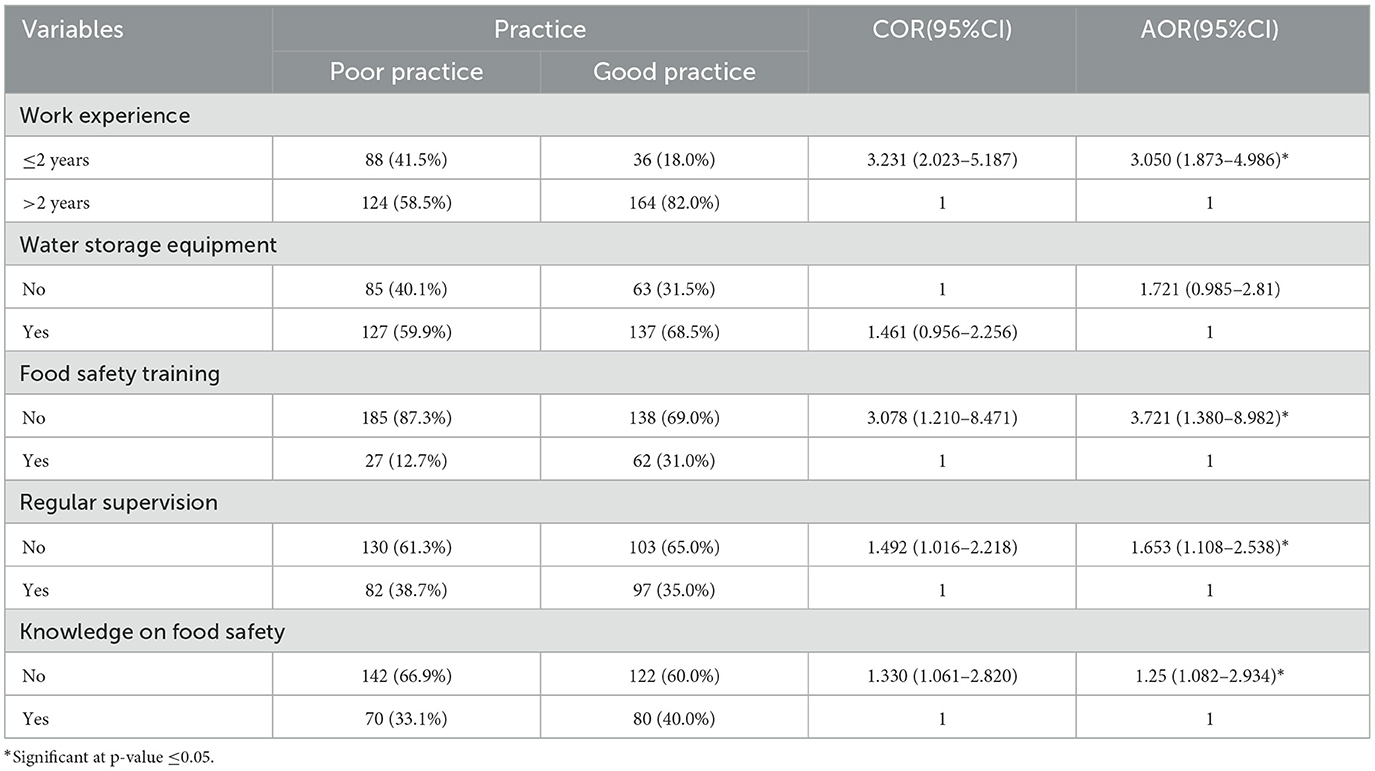
Table 5. Bivariate and multivariate logistic regression analysis of factors associated with food safety practice among food handlers in food establishments of Finote Selam town, Ethiopia, 2024 (n = 412).
Discussion
The results of this cross-sectional study revealed poor food safety practices in Finote Selam, Ethiopia, and studied the food safety practices and associated factors among food handlers. The findings of this study revealed that 51.6% of food handlers exhibited poor food safety practices. Our results were higher than those reported in Mettu and Bedelie (44.9%) (Tamiru et al., 2022), Fiche (49.5) (Teferi et al., 2021), and Nigeria (32%) (Iwu et al., 2017), but lower than findings from studies conducted in Bahir Dar (67.6%) (Derso et al., 2017), Jordan (89.4%) (Sharif et al., 2013), Mekelle (63.9%) (Nigusse and Kumie, 2012), and Malaysia (59.3%) (Rosnani et al., 2014). The discrepancies in food safety practices can be attributed to several factors, including differences in study settings, socio-demographic profiles of food handlers (such as age, education, and cultural background), and variations in study design and data collection methods. Additionally, differing cutoff criteria for defining poor practices and the timing of each study may reflect changes in awareness, training, and regulatory enforcement. These elements collectively help explain the higher percentage of poor food safety practices observed in this study compared to those in central Ethiopia and Nigeria (Birke and Zawide, 2019; Grema et al., 2020).
Several key factors were identified as contributing to poor food safety practices among food handlers in Finote Selam, including lack of regular supervision, absence of food safety training, limited work experience, and insufficient knowledge of food safety practices. Consequently, poor hygiene and sanitation practices were found to be widespread among food handlers in Finote Selam (Todd, 2020; Azanaw et al., 2019). In our study area, only 12.7% of food handlers had received certification in food safety training, which is lower than the 28.4% reported in other regions of Ethiopia (Azanaw et al., 2019), and 23.02% in Pakistan (Khan et al., 2022), but slightly higher than the 8.1% found in a study from South Africa (Akabanda et al., 2017). The variation in food safety training certification rates may be due to differing regional emphasis on training. Countries with higher rates often have robust training programs and regulations, enhancing food handler awareness. Conversely, the lower certification rate in this study indicates a lack of sufficient training initiatives or enforcement, which may lead to poorer food safety practices.
Individuals with 2 years or less of work experience were significantly more likely to exhibit poor food safety practices compared to those with three or more years of experience. This finding aligns with a previous study in Ethiopia, which reported that food handlers with <2 years of experience had a higher likelihood of poor practices compared to those with 2–4 or 5–7 years of experience (Lema et al., 2020; Tamiru et al., 2022; Kubde et al., 2016). The finding was supported by a study conducted in Fiche and Debra Markos town (Alemayehu et al., 2021; Teferi et al., 2021). This suggests that experience plays a crucial role in helping food handlers acquire the skills and knowledge necessary for proper food handling, possibly due to adaptation to the work environment and the sharing of experiences with coworkers.
In the present study, poor food safety practice was significantly associated with a poor level of food safety knowledge. Food handlers with poor knowledge were 1.25 times more likely to engage in poor food safety practices compared to those with good knowledge (AOR = 1.25; 95% CI 1.082, 2.934). This indicates that inadequate understanding of food safety contributes to unsafe handling behaviors. The finding is consistent with cross-sectional studies conducted in Gondar city (Alemayehu et al., 2021), Debre Markos town (Azanaw et al., 2019), Dangila town, Northern Ethiopia (Tessema et al., 2014), and Batu town, Central Ethiopia (Ab and Arero, 2021), all of which reported a significant link between limited food safety knowledge and poor hygienic practices among food handlers. Poor knowledge of foodborne disease transmission and food contamination routes hinders the adoption of essential safety measures (Grassi et al., 2008). In the current study, only 150 (36.4%of food handlers had good knowledge of food safety, indicating that the majority had poor knowledge. This figure is lower than those found in studies from Gondar (44.3%) (Azanaw et al., 2019), India (58.3%) (Mendagudali et al., 2016), and Malaysia (51.6%) (Rosnani et al., 2014). Such variations could be explained by differences in the study settings, development levels of the areas, and the sociodemographic characteristics of the respondents.
Moreover, regular supervision of sanitary practices was significantly associated to better food safety practices. Those who did not receive consistent supervision on sanitary practices had higher odds of poor food safety practices compared to those who did receive regular supervision. This study is supported by a study conducted in Ethiopia, that found poor food safety practice was higher among non-supervised food handlers compared to those who were supervised (Alzhrani and Shatwan, 2024; Tamiru et al., 2022; Bantie et al., 2023). One possible explanation of these findings is that regular supervision provides food handlers with ongoing guidance and accountability, reinforcing safe food handling behaviors. Supervisors can promptly identify and correct unsafe practices, while a lack of supervision may lead to lapses in safety standards, increasing the risk of unsafe practices.
Limitation of the study
The study had a small sample size, which limited the generalizability of the results, and its cross-sectional design made it difficult to determine causal relationships.
Conclusion
The present study revealed that 51.6% of food handlers in Finote Selam, Ethiopia exhibited poor food handling practices. The main contributing factors were lack of food safety training, limited work experience, insufficient supervision, and inadequate food safety knowledge. These findings highlight critical gaps in food hygiene management that could increase the risk of foodborne illnesses. To address these issues, food handlers should undergo regular and comprehensive training on food hygiene and safety to enhance both their knowledge and practical skills. Furthermore, health authorities should develop and enforce clear guidelines for regular sanitary inspections of food and drink establishments, ensuring consistent compliance with food safety standards. Strengthening regulatory oversight and investing in capacity-building measures for food handlers will be crucial steps toward improving public health outcomes in the area.
Data availability statement
The raw data supporting the conclusions of this article will be made available by the authors, without undue reservation.
Ethics statement
The studies involving humans were approved by the College of Medicine and Health Sciences at Debre Markos University's Research and Ethics Committee provided its ethical approval and clearance (Ref. No: CHS/005/02/2024). Before beginning data collecting, the letter of ethical clearance was submitted to the Finete Selam town administration. A permission letter was also obtained from the Finote Selam town administrator. After obtaining clearance from the Finote Selam town administrator office, data collection began by contacting study participants. Participants' involvement in the study shall be voluntary, and those who are unwilling to participate in the study or who wish to discontinue their participation at any stage would be informed to do so without any restrictions. Study participants were informed of the purpose of the study; confidentiality will also be maintained at all levels of the study. In addition, an informed verbal consent was taken from each participant. The studies were conducted in accordance with the local legislation and institutional requirements. Written informed consent for participation in this study was provided by the participants' legal guardians/next of kin.
Author contributions
AT: Conceptualization, Data curation, Formal analysis, Funding acquisition, Investigation, Methodology, Project administration, Resources, Software, Supervision, Validation, Visualization, Writing – original draft, Writing – review & editing. BA: Conceptualization, Data curation, Formal analysis, Funding acquisition, Investigation, Methodology, Project administration, Resources, Software, Supervision, Validation, Visualization, Writing – review & editing. BTA: Conceptualization, Data curation, Formal analysis, Funding acquisition, Investigation, Methodology, Project administration, Resources, Software, Supervision, Validation, Visualization, Writing – review & editing. TZ: Conceptualization, Data curation, Formal analysis, Funding acquisition, Investigation, Methodology, Project administration, Resources, Software, Supervision, Validation, Visualization, Writing – review & editing.
Funding
The author(s) declare that no financial support was received for the research and/or publication of this article.
Acknowledgments
First, the authors would like to thank Debre Markos University's College of Health Sciences for providing us with an ethical clearance letter and writing a letter of support for the study area. Second, the administrator of the Finote Selam town deserves our gratitude for giving us all the data we needed for this study. Last but not least, the authors express gratitude to all of the food handlers who responded to the survey for their willingness to participate.
Conflict of interest
The authors declare that the research was conducted in the absence of any commercial or financial relationships that could be construed as a potential conflict of interest.
Generative AI statement
The author(s) declare that no Gen AI was used in the creation of this manuscript.
Publisher's note
All claims expressed in this article are solely those of the authors and do not necessarily represent those of their affiliated organizations, or those of the publisher, the editors and the reviewers. Any product that may be evaluated in this article, or claim that may be made by its manufacturer, is not guaranteed or endorsed by the publisher.
References
Ab, S., and Arero, G. (2021). Food handlers safety practices and related factors in the public food establishments in Batu Town, Centeral Oromia, Ethiopia. Health. 2, 1–18.
Abdi, A. M., Amano, A., Abrahim, A., Getahun, M., Ababor, S., Kumie, A., et al. (2020). Food hygiene practices and associated factors among food handlers working in food establishments in the Bole Sub City, Addis Ababa, Ethiopia. Risk Manage. Healthcare Policy. 1861–1868. doi: 10.2147/RMHP.S266342
Akabanda, F., Hlortsi, E. H., and Owusu-Kwarteng, J. (2017). Food safety knowledge, attitudes and practices of institutional food-handlers in Ghana. BMC Public Health. 17:40. doi: 10.1186/s12889-016-3986-9
Alemayehu, T., Aderaw, Z., Giza, M., and Diress, G. (2021). Food safety knowledge, handling practices and associated factors among food handlers working in food establishments in Debre Markos Town, Northwest Ethiopia, 2020: institution-based cross-sectional study. Risk Manage. Healthcare Policy. 14, 1155–63. doi: 10.2147/RMHP.S295974
Alzhrani, W. F., and Shatwan, I. M. (2024). Food safety knowledge, attitude, and practices of restaurant food handlers in Jeddah City, Saudi Arabia. Foods. 13:2176. doi: 10.3390/foods13142176
Azanaw, J., Gebrehiwot, M., and Dagne, H. (2019). Factors associated with food safety practices among food handlers: facility-based cross-sectional study. BMC Res. Notes. 12, 1–6. doi: 10.1186/s13104-019-4702-5
Bantie, G. M., Woya, A. A., Ayalew, C. A., Mitiku, K. W., Wubetu, G. A., Aynalem, Z. B., et al. (2023). Food safety and hygiene practices and the determinants among street vendors during the chain of food production in Northwest Ethiopia. Heliyon. 9:e22965. doi: 10.1016/j.heliyon.2023.e22965
Birke, W., and Zawide, F. (2019). Transforming research results in food safety to community actions: a call for action to advance food safety in Ethiopia. Environ. Ecol. Res. 7, 153–170. doi: 10.13189/eer.2019.070305
Bogale, S., Kebede, D. M., and Kebede, D. A. (2016). Bacteriological quality of street foods, and knowledge and attitude of street food vendors and consumers about food safety in Adama town (Doctoral dissertation, Haramaya university).
Dagne, H., Raju, R., Andualem, Z., Hagos, T., and Addis, K. (2019). Food safety practice and its associated factors among mothers in Debarq Town, Northwest Ethiopia: community-based cross-sectional study. BioMed Res. Int. 2019:1549131. doi: 10.1155/2019/1549131
Derso, T., Tariku, A., Ambaw, F., Alemenhew, M., Biks, G. A., Nega, A., et al. (2017). Socio-demographic factors and availability of piped fountains affect food hygiene practice of food handlers in Bahir Dar Town, northwest Ethiopia: a cross-sectional study. BMC Res. Notes. 10, 1–7. doi: 10.1186/s13104-017-2965-2
Desta, L. B. (2022). Practices West Gojam Zone, Amhara Regional State. Ethiopia: Haramaya University.
Dora-Liyana, A. L., Mahyudin, N. A., Ismail-Fitry, M. R., Ahmad-Zaki, A., and Rasiyuddin, H. (2018). Food safety and hygiene knowledge, attitude and practices among food handlers at boarding schools in the northern region of Malaysia. Int. J. Acad. Res. Bus. Soc. Sci. 8, 238–66. doi: 10.6007/IJARBSS/v8-i17/5228
Fatunmbi, O. (2012). Assessment of sanitary conditions of food establishments and their patronage in selected communities in Ibadan North-West local government area of Oyo state (Doctoral dissertation).
Gazu, L., Alonso, S., Mutua, F., Roesel, K., Lindahl, J. F., Amenu, K., et al. (2023). Foodborne disease hazards and burden in Ethiopia: a systematic literature review, 1990–2019. Front. Sustain. Food Syst. 7:1058977. doi: 10.3389/fsufs.2023.1058977
Grassi, M., Osella, E., Civera, T., Bosca, R., Golzio, F., Rossignoli, M., et al. (2008). Hygienic and safety control of mass catering establishments. Industrie Alimentari. 47, 471–478. doi: 10.1111/j.1751-7176.2008.00001.x
Grema, H. A., Kwaga, J. K. P., Bello, M., and Umaru, O. H. (2020). Understanding fish production and marketing systems in North-western Nigeria and identification of potential food safety risks using value chain framework. Prevent. Vet. Med. 181:105038. doi: 10.1016/j.prevetmed.2020.105038
Iwu, A. C., Uwakwe, K. A., Duru, C. B., Diwe, K. C., Chineke, H. N., Merenu, I. A., et al. (2017). Knowledge, attitude and practices of food hygiene among food vendors in Owerri, Imo State, Nigeria. Occup. Dis. Environ. Med. 5, 11–25. doi: 10.4236/odem.2017.51002
Khan, M. J., Naeemullah, N. K., Wazir, A. K., Iqbal, A., Ishtiaq, M., Khan, S. A., et al. (2022). Knowledge attitude and practice of food handlers regarding food safety practices district Kohat Khyber Pakhtunkhwa Pakistan. Pakistan J. Med. Health Sci. 16:831. doi: 10.53350/pjmhs22167831
Kubde, S. R., Pattankar, J., and Kokiwar, P. R. (2016). Knowledge and food hygiene practices among food handlers in food establishments. Int. J. Commun. Med. Public Health 3, 251–256. doi: 10.18203/2394-6040.ijcmph20151572
Lema, K., Abuhay, N., Kindie, W., Dagne, H., and Guadu, T. (2020). Food hygiene practice and its determinants among food handlers at University of Gondar, Northwest Ethiopia, 2019. Int. J. Gener. Med. 1129–1137. doi: 10.2147/IJGM.S262767
Mendagudali, R. R., Akka, K. D., Swati, I. A., Shedole, D. T., and Bendigeri, N. (2016). Knowledge, attitude, and practices of food safety among women of Khaza bazar, the urban field practice area of KBN Institute of Medical Sciences, Kalaburagi, Karnataka. Int. J. Med. Sci. Public Health. 5, 516–520. doi: 10.5455/ijmsph.2016.20102015146
Mutua, F. K., Mutie, I., Kuboka, M., Leahy, E., and Grace, D. (2022). Literature Review on Foodborne Disease Hazards in Food and Beverages in Ethiopia. Geneva: Global Alliance for Improved Nutrition
Nigusse, D., and Kumie, A. (2012). Food hygiene practices and prevalence of intestinal parasites among food handlers working in Mekelle university student's cafeteria, Mekelle. Global Adv. Res. J. Soc. Sci. 1, 65–71.
Nordhagen, S., Hagos, S., Gebremedhin, G., and Lee, J. (2024). Understanding consumer beliefs and choices related to food safety: a qualitative study in urban Ethiopia. Public Health Nutr. 27:e239. doi: 10.1017/S1368980024002131
Nortey, A. N., Amu, H., Senu, E., and Effah, A. (2024). Knowledge, attitude, and food safety practices among street food vendors at a metropolitan district in Ghana: a cross-sectional study. Int. J. Food Sci. 2024:5553942. doi: 10.1155/2024/5553942
Osafo, R., Balali, G. I., Amissah-Reynolds, P. K., Gyapong, F., Addy, R., Nyarko, A. A., et al. (2022). Microbial and parasitic contamination of vegetables in developing countries and their food safety guidelines. J. Food Qual. 2022:4141914. doi: 10.1155/2022/4141914
Pattabhiramaiah, M., and Mallikarjunaiah, S. (2023). “Foodborne pathogens and food safety regulations,” in Food Microbial and Molecular Biology. Palm Bay: Apple Academic Press, 179–212.
Rosnani, A. H., Son, R., Mohhidin, O., Toh, P., and Chai, L. (2014). Assessment of knowledge, attitude and practices concerning food safety among restaurant workers in Putrajaya, Malaysia. Food Sci. Qual. Manage. 32:e27.
Ruel, M. T., Garrett, J., Yosef, S., and Olivier, M. (2017). Urbanization, food security and nutrition. Nutr. Health Dev. World. 2017, 705–735. doi: 10.1007/978-3-319-43739-2_32
Sharif, L., Obaidat, M. M., and Al-Dalalah, M-. R. (2013). Food hygiene knowledge, attitudes and practices of the food handlers in the military hospitals. Food Nutr. Sci. 4:245. doi: 10.4236/fns.2013.43033
Tamiru, S., Bidira, K., Moges, T., Dugasa, M., Amsalu, B., Gezimu, W., et al. (2022). Food safety practice and its associated factors among food handlers in food establishments of Mettu and Bedelle towns, Southwest Ethiopia, 2022. BMC Nutr. 8:151. doi: 10.1186/s40795-022-00651-3
Teferi, S. C., Sebsibe, I., and Adibaru, B. (2021). Food safety practices and associated factors among food handlers of Fiche Town, North Shewa Zone, Ethiopia. J. Environ. Public Health. 2021:6158769. doi: 10.1155/2021/6158769
Teferi, S. C. A. (2020). review on food hygiene knowledge, practice and food safety in Ethiopia. Sci. J. Food Sci. Nutr. 5, 023–9. doi: 10.11648/j.ijcems.20200605.14
Tessema, A. G., Gelaye, K. A., and Chercos, D. H. (2014). Factors affecting food handling Practices among food handlers of Dangila town food and drink establishments, North West Ethiopia. BMC Public Health. 14, 1–5. doi: 10.1186/1471-2458-14-571
Todd, E. (2020). Food-borne disease prevention and risk assessment. MDPI 17:5129. doi: 10.3390/ijerph17145129
Keywords: food safety practice, food handler, food and drinking establishments, Finote Selam, Ethiopia
Citation: Teym A, Adane B, Assaye BT and Zeleke TK (2025) Food safety practice and associated factors among food handlers working in food and drinking establishments in Finote Selam, in resource-limited settings. Front. Sustain. Food Syst. 9:1536240. doi: 10.3389/fsufs.2025.1536240
Received: 29 November 2024; Accepted: 09 June 2025;
Published: 01 July 2025.
Edited by:
Arun K. Bhunia, Purdue University, United StatesReviewed by:
Lochan Singh, Indian Institute of Science (IISc), IndiaSeydi Yikmiş, Namik Kemal University, Türkiye
Copyright © 2025 Teym, Adane, Assaye and Zeleke. This is an open-access article distributed under the terms of the Creative Commons Attribution License (CC BY). The use, distribution or reproduction in other forums is permitted, provided the original author(s) and the copyright owner(s) are credited and that the original publication in this journal is cited, in accordance with accepted academic practice. No use, distribution or reproduction is permitted which does not comply with these terms.
*Correspondence: Abraham Teym, YWJyaXNodGV5bTIzQGdtYWlsLmNvbQ==; YWJhcmFoYW1fdGV5bUBkbXUuZWR1LmV0
†ORCID: Abraham Teym orcid.org/0000-0001-5954-0923
 Abraham Teym
Abraham Teym Balew Adane
Balew Adane Bayou Tilahun Assaye
Bayou Tilahun Assaye Tirsit Ketsela Zeleke
Tirsit Ketsela Zeleke